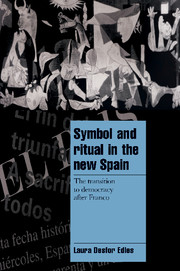Book contents
- Frontmatter
- Contents
- List of tables
- List of figures
- List of abbreviations
- Acknowledgements
- Map of Spain
- Part I Interpreting the Spanish transition to democracy
- Part II The symbolic basis of Spanish consensus
- Part III Conflict and consensus in the institutionalization of Spanish democracy
- 7 Democratic reaggregation and the 1978 Constitution
- 8 The Basque exception: questions of communality and democracy
- 9 Conclusion and epilogue
- Notes
- References
- Index
8 - The Basque exception: questions of communality and democracy
Published online by Cambridge University Press: 06 July 2010
- Frontmatter
- Contents
- List of tables
- List of figures
- List of abbreviations
- Acknowledgements
- Map of Spain
- Part I Interpreting the Spanish transition to democracy
- Part II The symbolic basis of Spanish consensus
- Part III Conflict and consensus in the institutionalization of Spanish democracy
- 7 Democratic reaggregation and the 1978 Constitution
- 8 The Basque exception: questions of communality and democracy
- 9 Conclusion and epilogue
- Notes
- References
- Index
Summary
The crucial exception in terms of Spain's “consensual” transition is the Basque Country. In contrast to communist, socialist, and Catalan leaders, who became more moderate and consensual as the transition progressed, Basque nationalist leaders became more estranged from “consensus” throughout the transition. The Basque Nationalist representative, Juan Ajuriaguerra, signed the Moncloa Pacts in October 1977 “with reservations”; but there were no Basque representatives on the Congressional Subcommittee on Constitutional Affairs (Ponencia), the subcommittee formed to draft the Spanish Constitution. As shown in Table 7.2, over half the Basques abstained in the 1978 Referendum on the Constitution, as compared with 31.7 percent in Spain as a whole. Moreover, of Basques who did vote, nearly 24 percent cast negative votes, in comparison with only 4.6 percent of Catalans, and 7.8 percent of Spaniards (see Table 7.2). Most alarmingly, as Basque participation in the “period of consensus” declined, violence by the Basque insurgent group Euzkadi ta Azkatasuna (Basque Homeland and Freedom – ETA) increased. As shown in Table 8.1, between 1968 and 1975, ETA was responsible for thirty-four deaths; but, despite an important lull in 1977, ETA was responsible for sixty-seven or more deaths each year in 1978, 1979 and 1980.
Historical background
The Basque Country lies in northern Spain and southwestern France, where the Pyrenees meet the Bay of Biscay (see Map of Spain).
- Type
- Chapter
- Information
- Symbol and Ritual in the New SpainThe Transition to Democracy after Franco, pp. 122 - 138Publisher: Cambridge University PressPrint publication year: 1998

